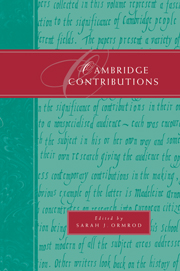Book contents
- Frontmatter
- Contents
- Notes on contributors and contributions
- Preface
- 1 Some Cambridge contributions to astronomy and cosmology
- 2 Cambridge's contribution to medical science
- 3 Cambridge and the study of English
- 4 The Cambridge contribution to economics
- 5 ‘Nasty forward minxes’: Cambridge and the higher education of women
- 6 Cambridge Classics for the third millennium
- 7 Cambridge contributions: the philosophy of science
- 8 European citizenship and education
- 9 The University Botanic Garden
- 10 Geophysics in Cambridge: extinct and active volcanoes
- 11 Cambridge spies: the ‘Magnificent Five’, 1933–1945
8 - European citizenship and education
Published online by Cambridge University Press: 31 December 2009
- Frontmatter
- Contents
- Notes on contributors and contributions
- Preface
- 1 Some Cambridge contributions to astronomy and cosmology
- 2 Cambridge's contribution to medical science
- 3 Cambridge and the study of English
- 4 The Cambridge contribution to economics
- 5 ‘Nasty forward minxes’: Cambridge and the higher education of women
- 6 Cambridge Classics for the third millennium
- 7 Cambridge contributions: the philosophy of science
- 8 European citizenship and education
- 9 The University Botanic Garden
- 10 Geophysics in Cambridge: extinct and active volcanoes
- 11 Cambridge spies: the ‘Magnificent Five’, 1933–1945
Summary
‘Citizenship means more than cricket, teachers warn’ ran the headline in the Times Higher Education Supplement when describing the findings of a research project based in Cambridge and funded by the European Commission (EC). Cricket in England has often been associated with citizenship. Indeed Norman Tebbit, when Minister for Trade and Industry in Mrs Thatcher's government, took the view that the ultimate test of national identity and ‘Englishness’ was the cricket match. Asian and Afro-Caribbean Britons who had lived all their lives in the United Kingdom, he argued, would be hard pressed to support the English cricket team against countries such as India or Pakistan or the West Indies. Their true loyalties of citizenship would indeed be revealed.
In this chapter I would like to explore English approaches to citizenship especially when challenged by the increasingly strong European agenda. Ever since Alexis de Tocqueville described what he called the ‘peculiarities of the English’ in the 1830s we have been engaged in discussing such peculiarities with a mixture of ‘celebration’ but also ‘lament’. Since the 1960s such renowned historians as E. P. Thompson, Perry Anderson, Eric Hobsbawn, have debated, for example, the peculiarities of our modern state. Why for example, was it that England was one of ‘the last of the major nineteenth-century powers to create a national system of education’ and ‘it was also the most reluctant to put it under public control’.
- Type
- Chapter
- Information
- Cambridge Contributions , pp. 143 - 168Publisher: Cambridge University PressPrint publication year: 1998
- 3
- Cited by

